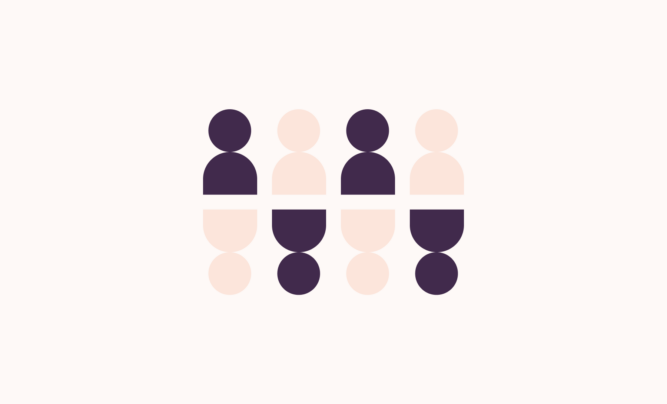When looking for the ideal candidate, there are so many things to check for. How well can they do the job? Will they get along with their coworkers? How will they react to and approach unexpected problems?
The good news for hiring managers is that there are a lot of tools and tests today at their disposal to help them glean the answers to most of these questions. And at the top of the list is cognitive ability assessment tools.
Starting from the beginning, let’s take a look at what cognitive ability really means, which are the best cognitive screening tools, and finish with some key reasons why you should want to evaluate cognitive ability in the first place.
TL;DR – Key Takeaways
- Cognitive ability refers to all the mental skills required to learn, solve problems, memorize, and perform tasks.
- For example, perception, memory, attention, language understanding, problem-solving, and decision-making are all fully under cognitive domains.
- Cognitive testing is used in hiring for several reasons: predictive validity, efficiency and cost savings, fewer chances of unconscious bias, and more standardized results.
- Best practices for running these tests include use at the beginning of the hiring process, letting candidates know that they will be tested and why, reviewing and updating often, and combining them with other tools to make good hiring decisions.
- The 5 best cognitive ability testing tools include Toggl Hire, Pymetrics, The Predictive Index, Talogy, and McQuaig.
- With Toggl Hire, you gain access to a rich library of job-specific and cognitive tests to test a range of hard and soft skills in your prospective candidates. The best bit? Every test is customizable, and you can automate the whole process, too, saving hours of your precious time!
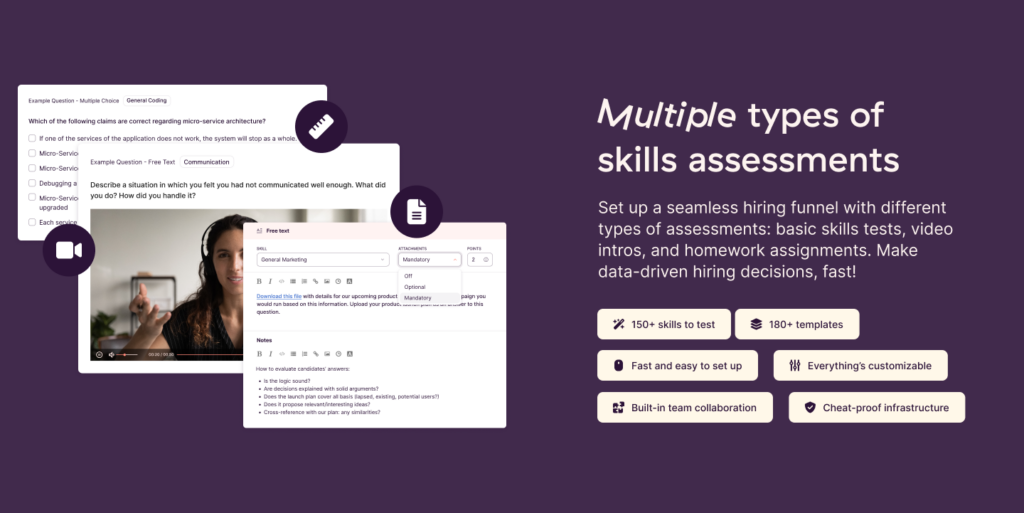
What is cognitive ability?
Cognitive ability (also known as cognitive function or capacity) is the human ability to learn, solve problems, perform tasks, and acquire and use new information. Cognitive ability encompasses many mental skills, such as learning, thinking, concentration, memory, perception, problem-solving, language processing, decision-making, executive function, and others.
These skills can be tested using cognitive ability tests. A popular example is the IQ test, which was developed specifically to measure cognitive ability. Other cognitive ability tests like Raven’s Progressive Matrices, Digit Span Test, Verbal Analogies, Abstract Reasoning, and Spatial Visualization are commonly included in IQ tests.
| Cognitive Ability | Definition | Work Context Example |
|---|---|---|
| Attention | The ability to focus on specific information or tasks while ignoring distractions. | Staying focused on a project despite interruptions or a noisy office environment. |
| Memory | The ability to store and retrieve information. | Remembering details from a client meeting to accurately complete a project or task. |
| Perception | The ability to interpret sensory information. | Interpreting data from a report to understand market trends. |
| Problem-Solving | The ability to find solutions to complex issues. | Identifying a bottleneck in a production process and devising a strategy to improve efficiency. |
| Decision-Making | The ability to evaluate information and options to make a choice. | Choosing the best vendor for a service based on a comparison of cost, quality, and reliability. |
| Language Understanding | The ability to understand and produce language. | Understanding and drafting a complex legal contract. |
| Numerical Reasoning | The ability to understand and work with numbers. | Analyzing financial data to make budgeting decisions. |
| Spatial Reasoning | The ability to understand and manipulate shapes and spaces. | Designing a productive layout for a new office space. |
| Executive Functions | Higher-order cognitive skills used for planning, organizing, and managing time and resources. | Planning a project timeline, delegating tasks, and monitoring progress to ensure timely completion. |
Conversely, cognitive impairment refers to poor memory, forgetfulness, and general cognitive difficulty, like learning new things or concentrating. Generally speaking, it’s more likely to affect us after retirement age. For example, Alzheimer’s is an illness that causes cognitive impairment, affecting a third of U.S. people aged 85 and above.
Why is cognitive ability important at work?
Pretty much every role requires cognitive ability to perform. However, the importance of strong cognition does vary between roles. Doctors and surgeons, for example, require higher cognitive ability than bartenders and other low-skilled jobs like cleaners and drivers.
If we think of physical jobs like athletes, or technical roles like IT engineers, we can see that other skills and talents may rank higher than cognition, even though we apply the cognitive ability to most situations, both in and outside of work.
Need an example?
Imagine a situation: you’re in an important meeting and need to use your cognitive skills.
- Perception. The person in the meeting should be able to fully understand all of the participants. This means not only catching verbal cues, but also interpreting information from slides, graphs, charts, and more. They should also be able to understand the finer nuances of language: tone of voice and body language.
- Memory. In and after the meeting, this person should use cognition to remember the meeting details and recall past situations and meetings before presenting. They should be able to use past information, remember it, and act based on it in the present.
- Attention. It isn’t easy to stay focused during a meeting, especially when the average human attention span is just over 8 seconds. The person in the meeting should be able to focus on the important details without getting lost or distracted while participating, asking and answering questions, and making decisions.
- Language understanding. This is not in the traditional sense of understanding multiple languages and the ability of verbal expression and comprehension (although that helps too). It means understanding and using language to communicate thoughts and ideas effectively. More specifically, ideas that are related to the job and the industry you are working in.
- Problem solving. If a problem comes up during a meeting, e.g., having to cover a month’s worth of work in one week, the ideal candidate needs to use their cognition and executive functions to solve that problem. What shortcuts can they take? Is it possible to get an extension?
- Decision-making. The ability to make difficult decisions on the spot is crucial. Let’s say the candidate needs to determine future needs for hiring right in the meeting – how many people to hire or outsource. That requires not just business understanding but also the ability to quickly analyze and summarize information before making a decision.
In short, all of these are important in a business environment in their own way, and a cognitive ability screening test can be a good way to determine if your ideal candidate has them or not.
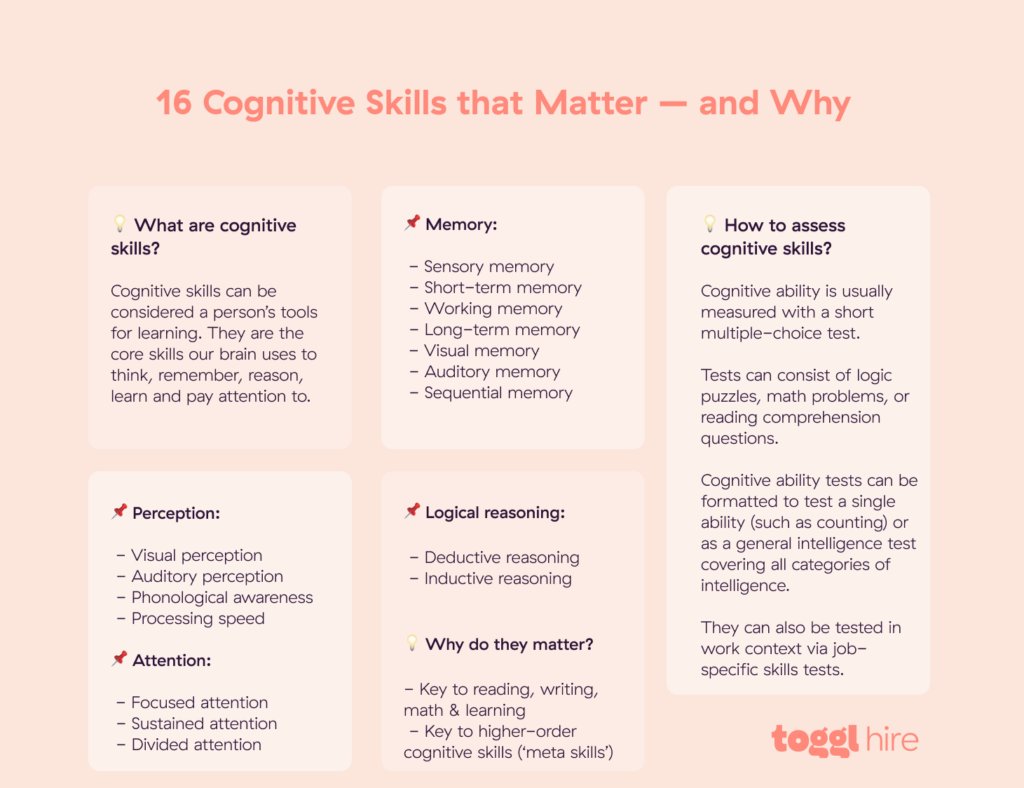
Why is cognitive ability testing used in hiring?
Employers like cognitive screening primarily because of the proven link between test results and job performance. In addition to these practical reasons:
1. Predictive validity
Simply put, candidates with great cognitive skills tend to perform better on the job. By using a cognitive assessment tool, you can determine not only if they can learn in general but also if they have what it takes to succeed in their future role. And, of course, if the candidate is a better fit for the job, this means a lower turnover rate too.
2. Efficiency and cost savings
Unlike traditional screening methods and techniques, such as screening resumes, cognitive assessment tools allow you to screen thousands of candidates at once. This also means hundreds of hours saved for you as the employer.
An added bonus to cognitive assessment tools is the cost saving. While running through resumes or cover letters would cost thousands of dollars in HR team time, these tools are much cheaper in comparison. And if you can see that a candidate scores lower than average, it will also save you in the long run.
3. Lower chances for unconscious bias
When you review your applicants’ resumes, unconscious bias can creep in, which is when someone gains an unfair advantage because of their educational background, work experience, or some other identifying factor that is not based on merit or ability.
Cognitive tests give you just that: an unfiltered view of someone’s mental performance.
4. Standardization
It can be pretty difficult to objectively compare candidates with different backgrounds and work experience without an objective measure, like cognitive tests.
With all the candidates taking the same screening tests, you’ll have a more objective way to compare them and find the best one out of the lot.
Cognitive assessment tools have many benefits, but this does not mean that they are the definitive answer to your hiring assessment needs. It is always best to use this testing method in combination with further assessment tools and techniques to get a more comprehensive and balanced view of your applicants.
Different types of cognitive ability testing
Several assessment tools have been developed over the years to test for cognitive ability. Depending on the specific skillset you want to test and what role candidates are applying for, you might choose one of these:
- MMAT – McQuaig Mental Agility Test
- GIA – Thomas International General Intelligence Assessment
- HBRI – Hogan Business Reasoning Inventory
- PLI – Predictive Index Learning Indicator
- RCAT – Revelian Cognitive Ability Tests
- WPT – Wonderlic Personnel Test
- CCAT – Criteria Cognitive Aptitude Test
Although these cognitive assessments are used for different purposes, they have one thing in common – they each test for more than one cognitive ability.
They are not meant to be very difficult, and the candidates usually have a very short time frame to answer many questions. For these reasons, very few candidates answer all of the questions in a single test, which is, of course, deliberate: processing speed is also a measure of cognitive ability. All of these tests are also good for spotting red flags, such as cognitive impairment.
4 Cognitive ability test best practices
Before you start with your cognitive evaluation tests, there are some tips and best practices to remember, especially if you’re doing it for the first time.
#1 – Set benchmarks and update them frequently
Most cognitive tests allow you to get a precise score for each candidate, expressed in numbers. After your candidates have completed a few screening tests, you’ll have a good idea of what constitutes a good score.
As you hire for different roles, you may discover that the benchmark you set is too high or too low, so make sure to update it as time goes by, as the average score might change after more new applicants.
You can then use that average score as a benchmark for future candidates and set an automated threshold that automatically determines which candidates are moved on to the next stage.
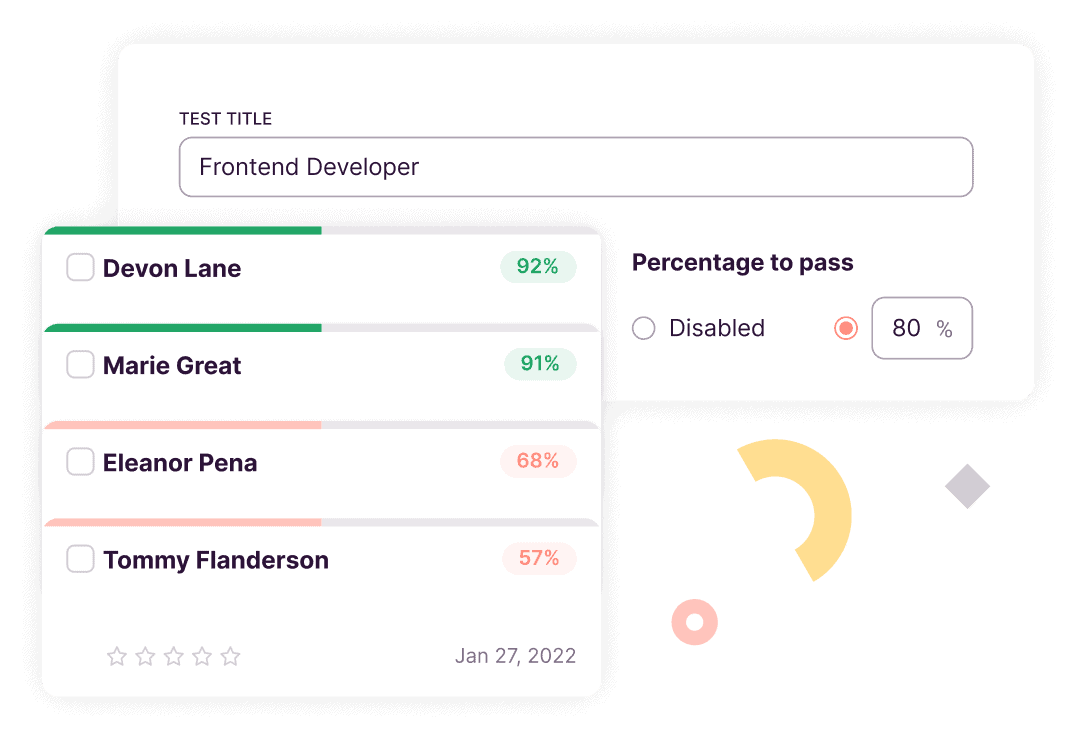
#2 – Use cognitive tests at the beginning of the hiring process
The ideal place to ask candidates to complete a cognitive test is at the point when they submit an application. This will allow you to screen thousands of candidates at once, immediately at the point of entry. Combine the test results with their LinkedIn profile and resume, and you can save dozens of hours per applicant.
More importantly, you’ll get to screen the best candidates only and disregard those unfit for the job. It’s definitely worth finding out if someone has a cognitive impairment immediately rather than waiting until the end of the hiring process.
#3 – Use test results in combination with other assessment tools
Screening tests for cognitive ability should be considered one piece of the puzzle. Depending on the skills needed for the role, someone could be amazing for the job but bad at cognitive screening tests.
This is why it’s important to consider the test results in combination with other aspects, such as work experience, education, a portfolio, interview performance, and more.
#4 – Tell your candidates what you’re testing for and why
In today’s competitive and interconnected environment, the candidate experience is crucial – and your applicants need to know what cognitive screening is all about.
They might get discouraged by a screening test and drop out before you even get a chance to see their application. Openly state what you are testing and why so that candidates are informed beforehand.
5 of the best cognitive assessment tools today
The screening tools for cognitive assessment are plenty, and we prepared some of the very best ones with their top features for you.
#1 – Toggl Hire
Toggl Hire is a pre-employment assessment and screening tool that allows you to test a wide range of hard and soft skills, including cognitive skills. With Toggl Hire, the main benefit is that you can vet potential employees for anything from design to sales to development and also for crucial cognitive skills. We’d go as far as to say that it’s the best cognitive function test on the market, but we’re a little biased.
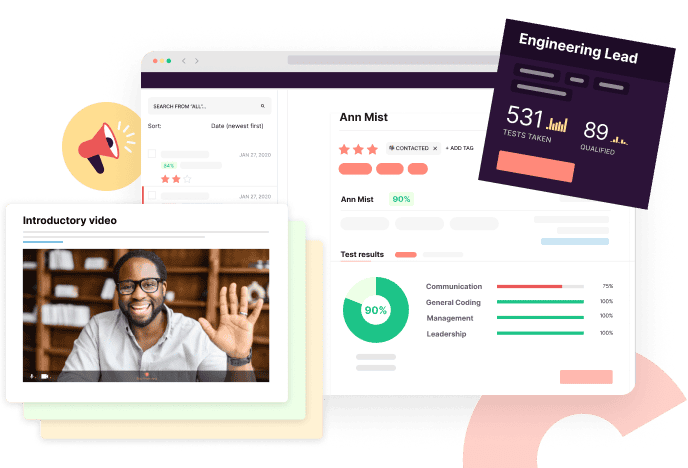
Where Toggl Hire excels is combining job-specific skills with more general cognitive skills in a single assessment test. This allows you to get a full overview of someone’s capabilities to see how they think and how likely they’ll do well in the job.
#2 – Pymetrics
Pymetrics is a soft skills assessment platform that lets you test your candidates’ numerical and logical reasoning. You can then get a HiredScore to predict which ones will most likely stay with you. If you have more openings, Pymetrics can show your “silver medalists”, as they call them, to another opening that better suits their cognitive and soft skills and their test scores.

#3 – The Predictive Index
The Predictive Index is a “talent optimization” platform offering several products to help hire and nurture top talent. They also offer cognitive tests based on “60 years of behavioral science,” so you can hand-pick the best people for the job based on the skills you need in a role.
In addition to their tests, PI are best known for their Behavioral Assessments, having mapped out 17 distinct reference profiles to help organizations build high-performing teams.

#4 – Talogy
With roots going back to 1946, Talogy is an enterprise-level talent management and assessment platform used by organizations such as Coca-Cola and Siemens. One part of Talogy is dedicated to cognitive ability testing, and it is called Mindgage. It has four different sections, called Crunch, Flow, Seek, and Sync, for testing numerical ability, mental rotation ability, perceptual ability, and verbal comprehension ability, respectively.
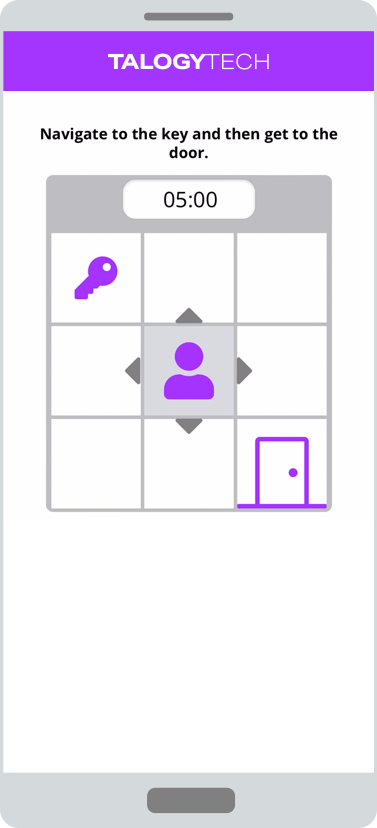
#5 – McQuaig
McQuaig offers a range of different tools for assessing candidates before proceeding further with their applications. Amongst them is a cognitive test to identify and screen for speed of thought, general intelligence and cognitive ability, the ability to process information, and the aptitude for learning and applying that knowledge.
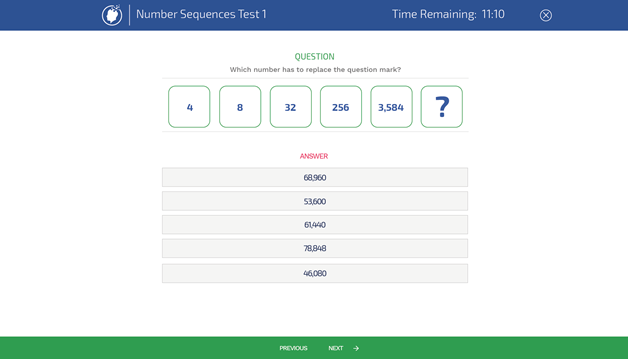
Why combine cognitive skills tests with other tests?
With a combination of job-specific skills tests and cognitive skills tests, you get a whole host of benefits for your hiring process.
Here are our top 3 reasons why you should consider these two test types in combination:
- First, you get a holistic overview of the candidate. You find out if they have the mental ability to learn on the job, adapt and make their own decisions, plus the skills to excel in their chosen role. Remember, cognitive tests only assess cognition and aren’t a substitute for testing practical, real-world skills.
- Second, you reduce bias as these tests are usually used as the first stage of the hiring process, which means less likelihood of someone on your team being influenced by someone’s gender, work experience, or the university they went to.
- Third, you’ll improve the candidate experience, as they can enjoy a more engaging hiring and evaluation process. Contrary to some expectations, 94% of almost 2000 candidates that responded to a recent survey answered that they see the value in skills tests as a way to demonstrate their potential to succeed beyond experience.
What’s not to like?
If you’re ready to give it a go, check out our Skills Assessment Library and sign up for free!
Juste loves investigating through writing. A copywriter by trade, she spent the last ten years in startups, telling stories and building marketing teams. She works at Toggl Hire and writes about how businesses can recruit really great people.







